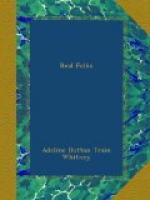“Until He takes us up and feeds us.”
“Why don’t He?—Mrs. Froke, when does He give it out? Once a month, in church, they have the bread and the wine? Does that do it?”
“Thee knows we do not hold by ordinances, we Friends,” said Rachel. “But He gives the bread of life. Not once a month, or in any place; it is his word. Does thee get no word when thee goes to church? Does nothing come to thee?”
“I don’t know; it’s mixed up; the church is full of bonnets; and people settle their gowns when they come in, and shake out their hitches and puffs when they go out, and there’s professional music at one end, and—I suppose it’s because I’m bad, but I don’t know; half the time it seems to me it’s only Mig at the other. Something all fixed up, and patted down, and smoothed over, and salted and buttered, like the potato hills they used to make on my plate for me at dinner, when I was little. But it’s soggy after all, and has an underground taste. It isn’t anything that has just grown, up in the light, like the ears of corn they rubbed in their hands. Breakfast is better than dinner. Bread, with yeast in it, risen up new. They don’t feed with bread very often.”
“The yeast in the bread, and the sparkle in the wine they are the life of it; they are what make the signs.”
“If they only gave it out fresh, and a little of it! But they keep it over, and it grows cold and tough and flat, and people sit round and pretend, but they don’t eat. They’ve eaten other things,—all sorts of trash,—before they came. They’ve spoiled their appetites. Mine was spoiled, to-day. I felt so new and fussy, in these brown things. So I turned round, and came here.”
Mr. Oldways’ saying came back into Mrs. Froke’s mind:—
“Haven’t you got any light, Rachel, that might shine a little for that child?”
Perhaps that was what the child had come for.
What had the word of the Spirit been to Rachel Froke this day? The new, fresh word, with the leaven in it? “A little of it;” that was what she wanted.
Rachel took up the small red Bible that lay on the lightstand beside her.
“I’ll will give thee my First-Day crumb, Desire,” she said. “It may taste sweet to thee.”
She turned to Revelation, seventh chapter.
“Look over with me; thee will see then where the crumb is,” she said; and as Desire came near and looked over her upon the page, she read from the last two verses:—
“They shall hunger no more, neither thirst any more.
“For the Tenderness that is in the midst of the Almightiness shall feed them, and shall lead them unto living fountains of water; and God shall wipe away all tears from their eyes.”
Her voice lingered over the words she put for the “Lamb” and the “Throne,” so that she said “Tenderness” with its own very yearning inflection, and “Almightiness” with a strong fullness, glad in that which can never fall short or be exhausted. Then she softly laid over the cover, and sat perfectly still. It was the Quaker silence that falls upon them in their assemblies, leaving each heart to itself and that which the Spirit has given.




